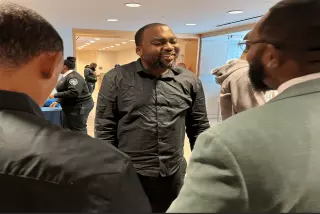Trying to Outsmart Bullets
- Share via
Micah Grant, 17, is a good kid from a tough neighborhood who is doing his best to graduate from high school, get into college -- and make it home each day alive.
The teenager’s first decision each morning -- what to wear? -- means choosing a T-shirt in a color considered safe, or at least neutral, by the gangs that rule his South Los Angeles streets. And so goes every other decision in a typical day, as recounted by Times staff writer Erika Hayasaki in a report Tuesday that was equal parts heroic and heartbreaking.
Take a shortcut in the eight-block walk to the bus stop? Too dangerous; a friend of Micah’s tried a new route once and was lucky to survive being shot. Join the other teens in the back of the bus? Nope, safer to stick with the adults in the front. Best place to wait for the first bell? On a bench under watch by a surveillance camera.
Micah’s precautions don’t stop once he’s inside Washington Preparatory High School. He knows exactly which patch of lawn in the quad to avoid at lunchtime, which teacher will open a closed classroom door to him when a brawl breaks out.
Newspapers are often criticized for writing about teenagers (or just about anybody else) only when they get in trouble. Micah’s story is about how hard one high school senior has to work to avoid trouble. His watchful parents and deep religious faith help. So do having a teacher who cares enough to offer him refuge and a principal who, trying to bring control to the campus after a near-riot in March, patrols the grounds hours after the last bell.
Micah’s 3.5 grade-point average is a testament to the power of personal responsibility. Yet the fact that he and thousands like him in neighborhoods throughout Southern California spend their days trying to outsmart bullets calls for communal responsibility as well. A society that sees stability and education as key to democracy and freedom in Iraq owes at least that much to its own children.
More to Read
Sign up for Essential California
The most important California stories and recommendations in your inbox every morning.
You may occasionally receive promotional content from the Los Angeles Times.













